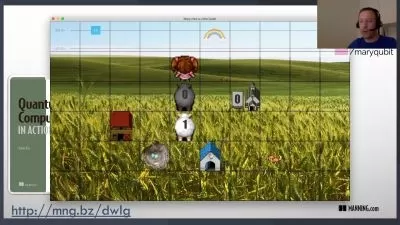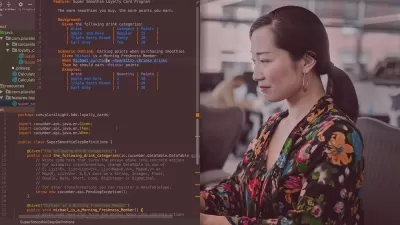Java Interview Masterclass: Top 350 Questions (PDF)(2024)
Happy Rawat
9:57:12
Description
Topics - Java Coding/ OOPS/ Exception Handling/ Collections/ Multithreading/ Generics/ Spring Boot/ MVC/ REST Services
What You'll Learn?
- 350 Java Interview Questions and Answers
- Core Java, Java Coding Questions, OOPS Concepts, Exception Handling, Collections, Multithreading, Generics, Spring, Spring Boot, Spring MVC, REST WebServices
- Java Interview Preparation and Crash Course
- Java interview guide in PDF format
Who is this for?
What You Need to Know?
More details
DescriptionOne Stop Destination For All Java Interview Questions and Answers.
Top 350 Java Interview Questions and Answers (Video Lectures + Revision PDF Book):
(Topics from which questions are covered)
1. Java-Basics
2. Variables & Data types
3. Operators
4. Control statements - Basics
5. Control statements - Advanced
6. String & StringBuilder
7. Arrays
8. Classes, Objects & Package
9. Access Specifiers, Getter-Setter & this keyword
10. Inheritance
11. Polymorphism
12. Encapsulation & Abstraction
13. Abstract class & Interface
14. Constructors
15. Exception Handling - Basics
16. Exception Handling - Advanced
17. Collections - Basics
18. Collections - Advanced
19. Multithreading Overview
20. Multithreading Implementation
21. Generics - Basics
22. Generics - Advanced
23. Lambda expression
24. Inner class & Final class
25. Static class & Enum
Top 30 Coding Questions
Mock Interviews
26. Spring - Basics, IoC & DI
27. Spring - Components & Beans
28. Spring - Configuration & Annotations
29. Spring - Scopes of a bean
30. Spring - Others
31. Spring Boot - Basics
32. Spring Boot - Project structure, Configuration & Actuator
33. Spring MVC - Basics
34. Spring MVC - Important Annotations
35. REST - Basics
36. REST - HTTP Methods & Status Codes
37. REST - CORS, Serialization, Deserialization, Others
38. REST - Authentication & Authorization
Revision PDFÂ Books: All notes are present in PDFÂ and PPTÂ format in resources of the course.
Code: For every question, the code is present in its slide notes of PowerPoint.
Interview Preparation Tracker Sheet: All questions listed in this tracker excel. Just have a look just before the interviews.
About Instructor: The instructor has more than 15 years of experience in full-stack development and has given and taken more than 100 interviews in his career. He helps candidates in cracking the interviews.
All the best for your interview preparation.
Remember, NEVER EVERÂ GIVEÂ UP before selection while giving job interviews.
Who this course is for:
- Candidate looking for Java jobs in software industry
One Stop Destination For All Java Interview Questions and Answers.
Top 350 Java Interview Questions and Answers (Video Lectures + Revision PDF Book):
(Topics from which questions are covered)
1. Java-Basics
2. Variables & Data types
3. Operators
4. Control statements - Basics
5. Control statements - Advanced
6. String & StringBuilder
7. Arrays
8. Classes, Objects & Package
9. Access Specifiers, Getter-Setter & this keyword
10. Inheritance
11. Polymorphism
12. Encapsulation & Abstraction
13. Abstract class & Interface
14. Constructors
15. Exception Handling - Basics
16. Exception Handling - Advanced
17. Collections - Basics
18. Collections - Advanced
19. Multithreading Overview
20. Multithreading Implementation
21. Generics - Basics
22. Generics - Advanced
23. Lambda expression
24. Inner class & Final class
25. Static class & Enum
Top 30 Coding Questions
Mock Interviews
26. Spring - Basics, IoC & DI
27. Spring - Components & Beans
28. Spring - Configuration & Annotations
29. Spring - Scopes of a bean
30. Spring - Others
31. Spring Boot - Basics
32. Spring Boot - Project structure, Configuration & Actuator
33. Spring MVC - Basics
34. Spring MVC - Important Annotations
35. REST - Basics
36. REST - HTTP Methods & Status Codes
37. REST - CORS, Serialization, Deserialization, Others
38. REST - Authentication & Authorization
Revision PDFÂ Books: All notes are present in PDFÂ and PPTÂ format in resources of the course.
Code: For every question, the code is present in its slide notes of PowerPoint.
Interview Preparation Tracker Sheet: All questions listed in this tracker excel. Just have a look just before the interviews.
About Instructor: The instructor has more than 15 years of experience in full-stack development and has given and taken more than 100 interviews in his career. He helps candidates in cracking the interviews.
All the best for your interview preparation.
Remember, NEVER EVERÂ GIVEÂ UP before selection while giving job interviews.
Who this course is for:
- Candidate looking for Java jobs in software industry
User Reviews
Rating
Happy Rawat
Instructor's Courses
Udemy
View courses Udemy- language english
- Training sessions 239
- duration 9:57:12
- Release Date 2024/10/31










